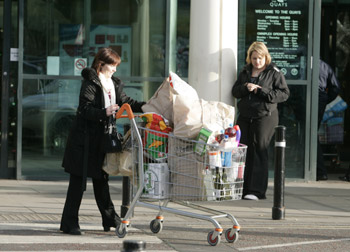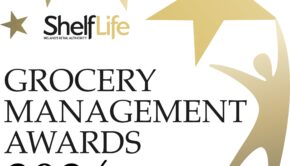UK tax rises best hope for ROI retailers

Irish retailers can forget about getting any help from the Government, the best they can hope for are sharp tax rises after next year’s UK budget
11 December 2009
The six-kilometre traffic tailbacks at Newry said it all. Public sector “workers” go on strike for a day to protest at proposed wage cuts and, instead of manning the picket lines, most of them bunk off to Newry for a day’s cheap shopping.
Higher excise duties, a 6.5% VAT gap and the euro at over 90p against sterling. For southern retailers this represents a toxic combination as hundreds of thousands of their cash-strapped consumers head north to avail of cheaper prices.
The great public “service” shop-in was merely the latest symptom of the enormous haemorrhage of southern spending power leaking over the border. IBEC estimates that cross-border shopping will result in a loss of €430 million of tax revenues to the exchequer this year.
With every day that passes the evidence that government must act to stem the cross-border flow mounts. A recent survey conducted by two Newry shopping centres, the Quays and the Buttercrane, calculated that 70% of the cars in their, enormous, car parks now carried southern registration plates, up from less than 50% during the summer.
Sterling efforts for UK retailers
Meanwhile off-licence sales in Northern Ireland are up 30% so far this year while southern off-licence sales are down by 7% over the same period. A recent survey found that 250,000 southern shoppers, about 16% of all households, now shop regularly in Northern Ireland, up from about 200,000 this time last year.
Matters haven’t been helped by this autumn’s fall in the value of sterling against the euro. After rallying to almost €1.20 during the summer it is now back under €1.10 against the euro. For southern shoppers this translates into an increase in the value of their euro from about 84p to almost 91p.
Suddenly your euros are stretching even further in Newry, Enniskillen, Derry and scores of other cities and towns in Northern Ireland. This of course has had a devastating effect on Southern retailing with an estimated 30,000 jobs having been lost in the past year.
Meanwhile the latest market research indicates that Sainsbury’s and Asda, neither of which has a single shop in the Republic, have a combined market share of at least 2.5% of the total Southern grocery market.
With over 780 stores throughout the United Kingdom, it is Sainsbury’s Newry store which is its second busiest. Even more remarkably Asda’s modestly-sized Enniskillen store, a mere 42,000 sq ft, is the chain’s second busiest, and the sixth most lucrative store in the entire worldwide Wal-Mart empire.
Can we stem the flow?
Appealing to people’s patriotism is not just a complete waste of time, it is also demeaning. With everyone watching their pennies, expecting shoppers to shop at home when, for some categories of goods at least, they can bag significant savings by doing their shopping in the North, is absurd. The fact that this nonsense is primarily peddled by our discredited politicians tells its own story.
Unfortunately there is nothing we can do about the euro/sterling exchange rate. The bad news is that, with the UK’s fiscal situation almost as bad as our own, sterling almost certainly has further to fall. This is bad news for southern retailers.
This inability to determine the exchange rate makes it even more important that we do whatever it takes to influence those factors which do lie within our control. Allowing a 6.5% gap between the Irish and UK VAT rates to open up was utter madness. While we could donothing about UK Chancellor of Exchequer Alistair Darling’s decision to cut the UK VAT rate by 2.5% to just 15% last November, putting up our already high VAT rate by a further 0.5% to 21.5% the following month was dumb, seriously dumb.
Even dumber was increasing the duty on a bottle of wine by 50c in the October 2008 budget. With Irish excise duties on spirits already completely out of line with those in the UK, jacking up excise duties on wine also rendered southern wine prices utterly uncompetitive with those north of the border.
These are only the most recent self-inflicted wounds. One consequence of having some of the best-paid public sector workers in Europe is that that public “services” are also extremely expensive in the South. This translates into much higher commercial rates, refuse charges and electricity bills.
Costs killing southern businesses
What does the government propose to do about these charges? Has it plans to reduce these charges so as to bring Irish costs more into line with those in the UK? Does it what. Despite its policy of truckling to the public sector trade unions having brought the country to the brink of bankruptcy, the government still seems determined to stick with the outdated and discredited “social partnership” model.
Far from banishing those self-same trade unions who brought us such horrors as benchmarking, the government still insists on molly-coddling them. Meanwhile, despite this year’s deflation Irish prices still remain almost 25% higher than the eurozone average.
In the absence of government action, Irish retailers can only hope that the external environment somehow improves. Don’t hold your breath. With sterling likely to remain weak the best for Irish retailers is that the incoming British government, almost certainly a Conservative one led by David Cameron, will massively hike UK taxes, including VAT and excise duties, after next May’s general election.
With the UK VAT rate scheduled to go back up to 17.5% at the beginning of next month there has been speculation that the next British government will push VAT rates up to 20% and raise other taxes, including excise duties, also. With the UK now borrowing £175 billion a year, the equivalent of almost 13% of GDP, the new British government, of whatever party, will be in desperate need of additional tax revenue to plug the enormous hole in its public finances.
These measures will go at least some of the way towards reducing the attractiveness of Northern Ireland to southern shoppers. By mid-year it is likely that UK prices, particularly alcohol prices, will be much closer to those in the Republic. But can southern retailers hold out for another six months? For the first six months of 2010 it will be a case of grimly hanging on in the hope of better times to come.



 Print
Print






Fans 0
Followers